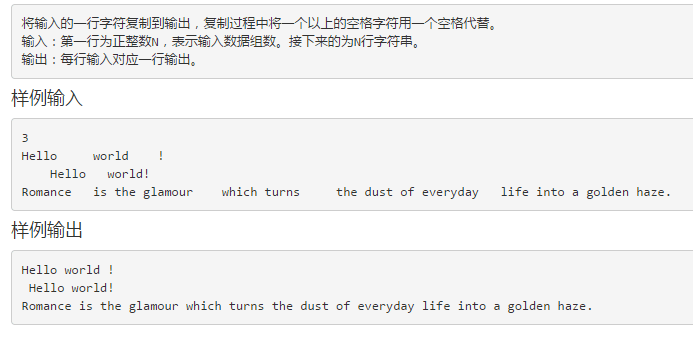【C语言】编写一个将输入复制到输出的程序,并将其中连续的多个空格用一个空格代替
2016-04-09 11:22
731 查看

数组
memset清空数组
fgets替代gets
fgets的原型是
char* fgets(char* s, int n, FILE* fp);参数数量比较多,有3个。而fgets相比于gets有一个显著的差别就是fgets会将行末的换行符算到读入的字符串里面。所以相同且正常(输入无错误,缓冲区够大)的情况下,fgets读入的字符串会比gets在末尾'\0'前面多一个换行符;行长度超出缓冲区大小时只读入前 n-1 个字符。因此,gets(s);相当于
fgets(s, sizeof(s), stdin);
if(s[strlen(s) - 1] == '\n') s[strlen(s) - 1] = '\0'; // 去掉换行符
其实,末尾这个换行符是另有妙用的。
#include <stdio.h>
#include<string.h>
int main()
{
int a,b=0,c=0;
char line[100],newline[100];
char temp;
scanf("%d%c",&a,&temp);
while(a--)
{
fgets(line,sizeof(line), stdin);//if scanf("%s",line); then whitespace can not inputed.
//printf("%d\n",strlen(line));
memset(newline,'\0',sizeof(newline));//temporary newline
int i,j;
i=0;j=0;
int isMoreSpace=0;
for(;i<strlen(line);i++)
{
if(line[i]==' ') isMoreSpace++;
else
{
if(isMoreSpace>0)
{
newline[j++]=' ';
}
newline[j++]=line[i];
isMoreSpace=0;
}
}
printf("%s\n",newline);
}
return 0;
}
/*input
3
hello kugou
ni hao a
ni ni ni ni
*/getchar
设置两个变量,分别记录当前输入的字符和上一次输入的字符,“上一个字符”初始化为EOF。如果当前输入字符为空,上一个输入字符也为空,则忽略当前输入的字符。
#include <stdio.h> /* http://www.cnblogs.com/wuzhenbo/archive/2012/12/02/2798029.html 当前输入字符可以分为两种情况: 1、当前输入字符不为空,则直接输出这个字符即可; 2、当前输入字符为空,这种情况又可以分为两种情况: ①、上一个输入字符也为空,则忽略此次输入的空格即可; ②、上一个输入字符不为空,则直接输出这个字符即可。 基本思想是: 设置两个变量,分别记录当前输入的字符和上一次输入的字符,“上一个字符”初始化为EOF。 如果当前输入字符为空,上一个输入字符也为空,则忽略当前输入的字符。 */ int main() { int c, pc; /* c = character, pr = previous character */ /* set pc to a value that wouldn't match any character, in case this program is over modified to get rid of multiples of other characters */ pc = EOF; int a; char tmp; scanf("%d%c",&a,&tmp); while ((a>0)&&(c = getchar()) != EOF) { if (c == ' ') if (pc != c) /* or if (pc != ' ') */ putchar(c); /* We haven't met 'else' yet, so we have to be a little clumey */ if (c != ' ') { if(c=='\n') a--; putchar(c); } pc = c; } return 0; } /*input 3 hello kugou ni hao a ni ni ni ni */
相关文章推荐
- CSP考试 2015年03月第3题 节日 C语言实现
- C++中的头文件和原文件
- C++ - STL- vector
- 【C语言】C语言的const与C++的const区别
- 【C语言】总结C语言深度剖析
- 【动态规划】最长公共子序列(并续)
- C++ 访问范围说明符
- C++异常处理机制几种方法
- c++中栈与队列的实现
- C++四种类型转换的关键字及其特点
- c++第3次实验—作业
- IIS7安装PHP-5.3.27教程, Visual C++ 2008(x86,x64)
- 以前用C语言编写的生成随机数的猜数字小游戏
- NOI 193棋盘分割.cpp
- 最小二乘法拟合直线
- C++ STL中Map的按Key排序和按Value排序
- C/C++——strcpy函数的实现
- 三种单例模式的C++实现
- C++定义的时钟类(主要是类的定义、数据成员、成员函数的定义,类对象的定义及对象之间的赋值的简单例子)
- [Hihocoder 1289] 403 Forbidden (微软2016校园招聘4月在线笔试)
